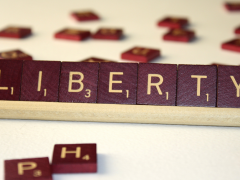With the Supreme Court decision looming in the Obamacare related case of King v. Burwell, and the Court’s decision due, it is worth stepping back and asking why health care isn’t considered a natural right in this country, instead of a symptom of big intrusive government? It is an interesting question and one that is not asked very often.
Countries with socialized medicine are thought to be examples of intrusive governments instead of governments that are protecting the rights of their citizens. The question about why protection of health care is not a natural right goes to the very heart of that difficult question of what are the rights of individuals that are considered “natural” and should be protected, and what role does government have in protecting them?
We Hold These Truths Self Evident
One would expect the answer to be relatively straightforward since “rights” are supposed to be transparent and self-evident to reason, according to the philosophical perspective that made them central to our way of thinking. Jefferson wrote that “We hold these truths to be self-evident” and that people “are endowed by their Creator with certain unalienable Rights, that among these are Life, Liberty and the pursuit of Happiness.” In writing these words in the Declaration, Jefferson was drawing on a philosophical tradition that reached back to the seventeenth century and was articulated most powerfully by John Locke in his Second Treatise on Government. If these rights were not transparent and self-evident, then they wouldn’t be “rights” and should instead be conceptualized as commitments and values. Even Jefferson acknowledged in the Declaration that “life, liberty, and pursuit of Happiness” were “among the rights” we were endowed with, implying there were others. And when the Bill of Rights was added to the Constitution, one of the fears was that people would think it exhausted the rights that individuals had, which was not the intent.
The self-evident rights that no one seems to contest are “life, liberty and the pursuit of happiness” in Jefferson’s felicitous phrase or “life, liberty and property,” as the other common set of self-evident rights mentioned in the Bill of Rights (Amendment V) and other important early American documents, such as the Virginia Declaration of Rights and the Declaration of Rights and Grievances by the First Continental Congress.
Nonetheless, we know that while the rightness of these rights is rarely contested, there are multiple interpretations of what these rights imply and the understanding of those rights change over time.
The rights to liberty, as we know, only gradually came to include Africans and their right not to be enslaved. Similarly the “right to life” is now thought by some to include the unborn fetus and by others to include the criminal condemned to death. Others disagree the rights extend that far.
One can argue perhaps that these are “edge cases” and that no one seriously challenges the core right to life, merely its interpretation. But the fact that the right is open to various interpretations gives pause about the role of culture and values in defining what a right is or should be. In fact, the issue is more complex than the problem of interpretation, extending even to what rights are included in our basic, self-evident rights.
What Makes Something A Natural Right?
Why isn’t health included in that list of natural self-evident rights we were endowed with along with life, liberty and property? Why doesn’t government have a duty to protect the health of its people, just as it does our property? Isn’t health a kind of property anyway and ultimately more important than physical property? Who needs property if you don’t have your health? And isn’t the protection of health really only a part of protecting the right to life anyway?
To try and answer these questions, let’s look at why life, liberty and property are thought to be natural, self-evident rights in the first place. The argument, assumed by the founders and made so eloquently by John Locke in his Second Treatise on Government, is that people are born with these self-evident rights and that the rights are self-evident by Reason and through Scripture both. Locke argues that humans have a right to life is because we are God’s “workmanship” and therefore to take the life or harm another person physically would be to destroy the property of God. Locke sees an analogy between the creation of human beings and the creation of property. The creator in both cases owns that which he has labored to produce. Thus, humans have a natural right to property because 1) we are told in Scripture that God gave the earth to humans for their use (Genesis 1:28-29). But we can also arrive at the same conclusion independently by reason. Since we have an inborn instinct to self-preservation, reason and nature tells us that we must have the means to sustain ourselves.
One can (and some do) question the very grounds of these justifications of rights.[1] But the fact that these justifications of natural rights are somewhat shaky has been long forgotten, since our tradition has taken life, liberty and property as an unquestioned foundational point, whose original justification is no longer remembered or matters. No one asks anymore about their philosophical justification or origin. They just are our rights now because the Declaration says so.
Having established that the rights of life, liberty and property exist in nature (and thus are “natural rights”), Locke explains why government cannot infringe them. People would not voluntarily give up the rights they possess in nature to join a political community, unless their core basic rights would be preserved and protected. They would only agree to leave their natural state if society does not take away these primary rights. Thus we arrive at the conclusion that government must not infringe on the natural rights of individuals.
Isn’t Health Part of Life and Property?
I am condensing here a much more detailed argument in the natural rights tradition in order to get to the current question at hand. Why isn’t health on this list of natural rights? Couldn’t the original justification of the right to life be extended to include health? If the right to life derives from the view that we are all God’s property, then isn’t it fair to say that someone who damages the health of another person intentionally or through negligence is also damaging God’s property and thus our natural right? Isn’t health just part of life, since damage to our health can be damage to our lives?
It is intriguing, in fact, to see that Locke includes “health” in one of his formulations of our basic natural rights. As Locke put it in his classic formulation, which may have influenced Jefferson’s formulation of the Declaration: [2]
The State of Nature has a Law of Nature to govern it, which obliges every one: and Reason, which is that Law, teaches all Mankind, who will but consult it, that being all equal and independent, no one ought to harm another in his Life, Health, Liberty or Possessions
Locke goes on to give the origin of such rights:
For Men being all the Workmanship of one Omnipotent, and infinitely wise Maker: All the Servants of one Sovereign Master, sent into the World by his order, and about his business they are his Property whose Workmanship they are, made to last during his, not one anothers Pleasure: and being furnished with like Faculties, sharing all in one Community of Nature, there cannot be supposed any such Subordination among us, that may Authorize us to destroy one another, as if we were made for one anothers use, as the inferior ranks of creatures are for ours. (Locke II ¶ 6)
The fact that “health” appears in Locke’s list of natural rights, alongside of life, liberty and possessions, is important all by itself in suggesting that one of the principal natural rights philosophers thought of health as a natural right.
But that is not the only reason health should be a natural right. It seems self-evident that health would be a most basic possession of an individual human being. If we assume that there are natural rights, then it would seem that the possession of health is more important than anything else besides life, and is in fact really part and parcel of what it means to have a right to life and what it means to have property in one’s body.
Health as a Natural Right
If we were to follow the same logic that made Locke and the founders believe that government should protect our natural rights, we should assume that one would not enter political society if one had to lose the right to protect one’s health. Just as one doesn’t give up one’s right to life, liberty or property when entering the social contract, one would not give up the right to health. The conclusion must be, therefore, that government has as much of a duty to protect health as it does life and property.
So what would a right to health look like? Would it not look like the right to life itself? Yes it would. And if so, then like the right to life itself, the right to health would have, on the one side, a negative or protective dimension to it and, on the other side, a positive or affirmative dimension to it. The negative or protective dimension is familiar to all of us:
Others would not be able to take away or harm one’s health, just as they could not take away life or harm property. And if that were so, then there should be a whole host of laws and regulations to protect my health, just as there a host of laws to protect my life and my property from the damage of others. For example, one cannot drive a hundred and fifty miles an hour on the road or drive a tank in a public place, because by doing so they endanger the lives of others.[3] Similarly, one cannot drive a tractor over your neighbor’s property without permission, since your neighbor gets to decide what is good or not good for his property.
Recognition of health as a natural right should increase the laws that regulate harm to people’s health. It would expand the laws about what businesses can put into the air, the land, the water and the climate in general. The EPA, instead of being attacked as an example of an intrusive governmental agency, would be understood as an agency that ultimately can protect the lives and health of the population. In fact, the obligation to protect the natural right of health could be understood as basis of the government’s obligation to address climate change. The changes that are occurring in the climate that are human produced are threats to the lives and health of millions. To be sure, we still have the issue that some people deny that humans are causing climate change, but the question is who gets to decide what constitutes a threat to health. I tackle that question below.
Health Should Generate Positive, Preventive Obligations Like Defense
In addition to the “negative” protections that a natural right to health would require, there are also positive obligations and duties that fall on government that provide justification for government sponsored healthcare. Government has a positive duty to protect a person’s property and a person’s life. That is why we have a military since one of the core government functions is to proactively be ready to defend the lives and property of its citizens. The investment in military is preventative. It is not after the fact. We don’t raise money after we are attacked. We put in place a substantial part of our budget to proactively protect our citizenry. That is because if we do not have a strong military, we cannot be ready for an attack.
The same logic which justifies a proactive and preventative investment in the military justifies a proactive and preventative investment in healthcare. We can’t wait until citizens are sick and ill to invest in their health. By then it is too late and their property in their bodies and lives has been eroded. Government’s duty is proactive and preventative. Thus, in the same way that rights to life and property justify a preventative and proactive government investment, so too with health care. There is no difference between protecting our commonwealth and protecting our bodies and our health.
The analogy with the military and the defense of citizenry is useful here because even the critics of government tend to believe in a strong investment in the military and defense. But the defense of our country, and its citizens’ lives and properties, which justifies the military, is not different from the question of health. Moreover, just as the military has its own regime that determines what is a proper defense of the country and proper investments of government spending, it would be appropriate to have a similar regime that determines what is the appropriate government investments in health.
The decision to fund the military is up to a democratic process. But the specific decisions that the military makes are determined by experts that are ultimately appointed by the president. The same should be true of health care. Government’s duty to protect the health of citizens should have its own regime of experts, who are qualified by their expertise and background in medicine and health, who determine how government healthcare is implemented.
The upshot is that healthcare should be a natural right that is protected by the political sovereignty of a people. If we are going to argue that life, liberty and property are natural rights, then healthcare should be as natural a right as those. And as in those natural rights, health should have a government that protects the right affirmatively, with proactive and preventative programs.
***
[1]For a broader discussion of the issue, see my book, Beyond Liberty Alone: A Progressive Vision of Freedom and Capitalism in America.
[2] On Locke’s possible influence on Jefferson, see my discussion in Liberty in America’s Founding Moment.
[3] I discuss this at length in my essay, “Why Can’t My Daughter Drive A Tank?”




